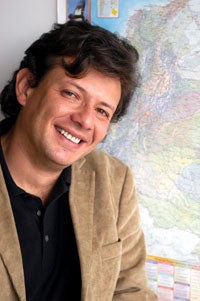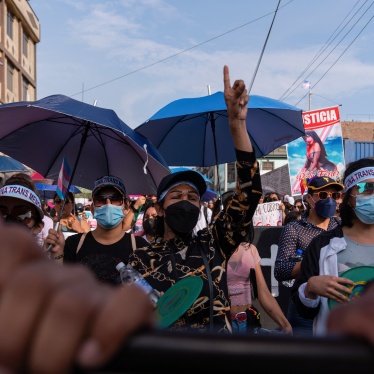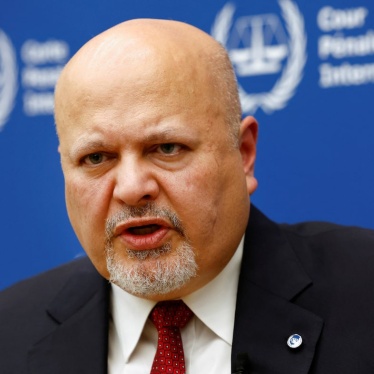Two summers ago, Hollman Morris’s babysitter walked out the front door of the Morris home and into Bogota’s sunlight to find a funeral wreath nestled on the steps. The message wasn’t hard to figure out: the next delivery for Morris, a celebrated journalist who exposes military, guerrilla and paramilitary atrocities, could be a coffin.
Two summers ago, Hollman Morris’s babysitter walked out the front door of the Morris home and into Bogota’s sunlight to find a funeral wreath nestled on the steps. The message wasn’t hard to figure out: the next delivery for Morris, a celebrated journalist who exposes military, guerrilla and paramilitary atrocities, could be a coffin.
|
Colombia’s decades-long, drug-fueled armed conflict has exposed Colombians to unremitting, deadly violence – including massacres, kidnappings, and summary executions. The violence is compounded by widespread impunity for abuses and constant challenges to the rule of law.
Morris, a well-known television journalist, documentary filmmaker and writer who championed the victims of this political violence, had already left the country once, in 2000, because of threats made against him. He returned a year later to continue covering Colombia’s armed conflict and human rights abuses. Morris’s highly acclaimed television program Contravia (“Countercurrent”) is the only Colombian show to specifically investigate the causes and implications of these abuses; it addresses some of the most difficult and controversial issues in Colombia today.
Morris takes Contravia’s cameras deep into Colombia’s countryside; his program eschews the stereotypes of victimization, choosing instead to capture in full throat the range of the Colombian response to terror and violence. His journalism has shown the daily, invisible work of Colombian activists rebuilding communities, the people he says are “motivated by hope, struggling for life, and fighting for memory.”
“I’ve practiced a type of journalism that’s very close to human beings, to the Other – very close to the poor, the humble, the victims of the war in this country,” Morris said. “They’re people or leaders who, despite the threats, despite all the risks, stay there, in the regions, trying to make this country more democratic, trying to keep a school going, or a road, or putting together a community action group. They know that they’ll be killed and in spite of this they stay on there in the regions.”
In the big cities, Colombia has a veneer of affluence and security. Tourism is on the rise and cafes and open-air restaurants are flourishing, as are the arts. But the country, which receives significant US military assistance, still suffers deeply entrenched human rights problems. In 2006, there were 72 reported killings of trade unionists, a number that, while lower than in previous years, even the Colombian ambassador to the United States acknowledged was the “highest in the world.”
Drug-running paramilitary groups, in theory disbanded by the government, continue as spidery mafia-like organizations, engaging in extortion and killings while maintaining close links to high-ranking political figures. Human rights defenders and journalists are frequently silenced by threats. In rural areas, peasants live every day with the risk that they will step on a landmine placed by guerrillas, that their children will be recruited to fight for one of the armed groups, or that their whole families will be forcibly displaced from their land. It is this – the violent rupture in the lives of so many Colombians – that Morris explores in his journalism.
Two years ago, for example, Morris was the first journalist to conduct on-the-ground television interviews with witnesses from the peace community of San José de Apartadó after the horrific massacre of two families there, perhaps at the hands of the military.
Morris also has cast a bright light on the issues confronting Colombia’s indigenous people, who are among the country’s poorest and most vulnerable to abuse. His broadcasts from remote towns and villages not only have spurred a popular response to the displacement of indigenous Colombians, but have empowered indigenous people uprooted from their communities to mobilize for increased recognition and rights.
According to Morris, his TV show Contravia “from the very beginning, set out for itself the goal of strengthening a culture of democracy, a culture that respects debate and ideas. Above all, we aimed to travel around the country, to the most distant places affected by the conflict, in order to give a voice to the victims.”
Morris has also injected a human rights component into discussions of some of Colombia’s thorniest issues, such as the recent scandals on paramilitary infiltration of the political system, or the failures of the government’s controversial paramilitary demobilization process. Through tough interviews with high-level officials, careful analysis of the issues with scholars and activists, and independent investigation he has consistently elevated the standards of public discussion, while doing a great deal to educate Colombians about what is happening in their own country.
“There was a whole process by which paramilitaries co-opted a large chunk of Colombia’s state institutions,” says Morris. “So, today the question Colombians ask themselves is: how far did these links go? How much of the government has been infiltrated by the paramilitary project? To what point can we realistically speak of democracy in Colombia with what’s going on?”
Morris has spent virtually all his career drawing attention to and denouncing human rights abuses in a variety of settings: through local and national radio and television, as the founder and editor of the Peace and Human Rights section of the newspaper El Espectador, as a documentary filmmaker, and as an independent writer. His work has been recognized abroad and at home, winning the International Press Freedom award in 2006, given by the Canadian Journalists for Free Expression. This year, Morris will be receiving the 2007 New Iberoamerican Journalism Award from the hands of Nobel-prize winning novelist Gabriel García Márquez.
This high profile, however, has also put Morris at great personal risk. His phone is routinely tapped. Shadowy groups have tried to link Morris to leftist guerrillas, a charge he says was designed to discredit and endanger him. President Alvaro Uribe, who frequently makes statements stigmatizing journalists and human rights defenders, made similar false accusations against Morris, which he later had to withdraw.
“Right now, Colombia has huge problems, and one of those problems is the guerrillas, who don’t respect international humanitarian law, who resort to the practice of kidnapping, … and who take radical positions,” Morris, who has regularly covered guerrilla abuses, explained. “We’re not saying that it’s not the most serious problem, but what we are asking for is that Colombia’s reality be presented truthfully, without manipulation. There is another phenomenon in this country, that of paramilitaries, that remains active.”
Morris notes that while the Colombian government has with reason fought the guerrilla groups, it has failed to confront the paramilitaries, who are just as abusive as the guerrillas.
“During the past few years, through our television program Contravia, we aimed to denounce all this in greater depth,” said Morris. “Unfortunately, this is dangerous and that’s why I’ve been threatened. I just turned 39, and since I turned 30 there have been many threats.”
But Morris will keep doing what he does because, he says, “I’m convinced that we have to build this, that we have to strengthen this democracy, we have to create a more inclusive country, and this requires the help and sacrifice of everyone.”
For more information about journalists in Colombia visit the Committee to Protect Journalists website








